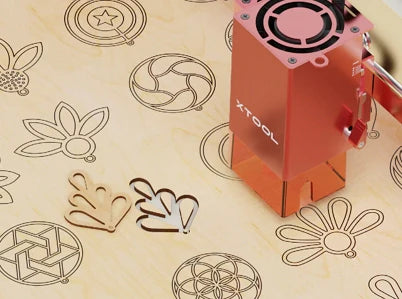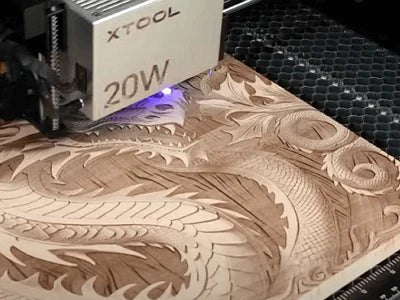In the realm of personalized items, engraved mugs hold a special place. From thoughtful gifts to promotional items for companies, these uniquely etched mugs are more than just vessels for our favorite beverages. They also serve as pieces of personal expression and celebration, with individuals often displaying them proudly on their shelves or giving them away on special occasions. In the world of e-commerce, the demand for personalized mugs is rising, making the art of mug engraving not only a creative endeavor but also a promising business opportunity.

Whether you're planning to design a customized mug for a friend, family member, client, or even to sell to the broader public, learning how to engrave mugs can open up a wealth of possibilities. However, engraving a mug presents its own unique challenges compared to engraving flat surfaces, such as a piece of wood. The cylindrical shape of mugs necessitates precise rotation during the engraving process while maintaining stability to ensure a flawless result.
In this comprehensive guide, we will walk you through the process of engraving a mug, from the initial design to the final product, using a laser engraver with a rotary attachment. With clear, step-by-step instructions, even beginners will find themselves well-equipped to embark on this exciting journey. Whether you're exploring this as a hobby or as a potential business venture, our guide will provide all the necessary insights to help you successfully engrave your first mug.
In This Article
- Can You Laser Engrave a Mug?
- Materials and Tools Needed for Laser Engraving Mug
- How to Laser Engrave a Mug with xTool D1 Pro?
- Mug Laser Engraving FAQs
Can You Laser Engrave a Mug?
The Ability to Laser Engrave a Mug
After introducing the concept of laser engraved mugs and the business opportunity they present, one question naturally arises: "Can you really laser engrave a mug?" The simple answer is, absolutely, you can. With the right equipment and a bit of practice, you can precisely engrave a diverse range of designs onto a mug's surface, whether it's a coffee mug or beer mug, creating a unique and personalized item.
Mugs' Material Considerations for Laser Engraving
While it's entirely possible to engrave a mug, it's essential to understand that not all mugs are created equal. The success of your engraving project heavily depends on the material of the mug. Mugs, usually made of ceramic or glass, are excellent candidates for laser engraving. Ceramic is particularly suitable for laser engraving due to its hardness, thermal resistance, and smooth surface, which allows for incredibly detailed and precise engravings. Glass, on the other hand, can also be engraved effectively, creating beautifully frosted patterns. However, keep in mind that different materials will require different settings on your engraver, including variations in power and speed.
The Importance of a Rotary Attachment
The cylindrical shape of a mug adds an extra layer of complexity to the engraving process. This is where a rotary attachment becomes indispensable. A rotary attachment allows the mug to rotate at a controlled speed while the laser is working, ensuring an even, continuous pattern all around the mug.

Safety Precautions
Before we delve into the how-to, let's touch on safety. As laser engraving involves high-powered machinery and potentially harmful fumes, it's crucial to prioritize safety. Always use protective eyewear, ensure your work area is well-ventilated, and never leave the laser unattended while it's operating.
Materials and Tools Needed for Laser Engraving Mug
Before diving into the steps of laser engraving a mug, let's take a look at the tools and materials you'll need for this project. Having these on hand before you start will make the process go more smoothly.
Laser Engraver
The cornerstone of this project is, of course, the laser engraver. In this guide, we will be specifically focusing on using the xTool D1 Pro. xTool D1 Pro is a beginner-friendly laser engraving and cutting machine. Beginners can easily use it and its specialized software xTool Creative Space.

Rotary Attachment
As mentioned earlier, a rotary attachment is essential when laser engraving cylindrical objects like mugs. This tool enables the mug to rotate at a controlled speed, ensuring an even, continuous design. Here we will use the RA2 Pro for our project. Rotary Attachment 2 (RA2) Pro is the world’s first 4-in-1 rotary attachment. It has a roller rotary, chuck rotary, ring rotary, and sphere rotary. Therefore, this single rotary attachment can work on 90% of the rotary laser engraving scenarios.

Ceramic or Glass Mug
Choose a mug that fits your style or purpose. While ceramic and glass mugs are the most common choices, ensure whatever mug you pick is compatible with your laser engraver.
For ceramic and glass mugs, CO2 laser engravers are often the go-to choice. These lasers operate at a wavelength(10,600nm) that is ideal for engraving or etching non-metal materials, including ceramic and glass. Please note that the results can vary based on the glaze and color of the ceramic mug. Diode laser engravers are a more affordable option for engraving ceramic and glass mugs. However, due to the materials' reflective nature, you will need to coat it with something such as laser marking paper to help wrap up the laser heat when using a diode laser to engrave a mug.

Protective Gear
Safety should always be your priority when working with laser engravers. Protective eyewear is a must to shield your eyes from the laser. Gloves are also recommended to protect your hands from potential heat or sharp edges.
Computer and Engraving Software
Finally, you'll need a computer with laser engraving software installed to create and send your designs to the laser engraver. The software you use will depend on the model of your engraver. For the xTool D1 Pro, xTool Creative Space or Lightburn are excellent choices.
How to Laser Engrave a Mug with xTool D1 Pro
Step 1: Setting up Your Laser Engraver
First, you need to make sure your xTool D1 Pro is ready for engraving. Turn it on and connect to the computer. Then connect the RA2 Pro with it and place the attachment in the working area. Here is a detailed guide on how to use the RA2 PRO.
Step 2: Preparing Your Mug and Design
Measure the dimensions of the mug. Measure its circumference and height. Depending on the type of material, you can use laser marking tape or tempera paint to coat it. Then, place the mug on the rotary attachment and adjust the position of the laser module through the red cross and adjust its focus. Import the image or graphic to the software and adjust its size over the mug.
Step 3: Choosing the Laser Settings for Your Mug Engraving
Select the power and speed according to the material. You can see the power and speed settings from this material settings table.
Step 4: The Engraving Process
Click Start. You will see a new window on the screen. Switch on Cylinder Working. Now, click on framing, and the laser module will trace the frame of the design. It will give you a complete idea of the position of the laser module and the size of the image. Finally, click on the Start button to start engraving.
Step 5: Post-Engraving Process
After engraving, you will need to remove the coating to reveal the engraving. You can soak it in water for a while to remove it easily.
Mug Laser Engraving FAQs
How Do You Permanently Mark a Ceramic Mug?
Permanent marking on a ceramic mug can be achieved through laser engraving. The laser reacts with the glaze on the ceramic surface to create a contrast, which forms your design.
Are Laser Engraved Mugs Dishwasher Safe?
While laser engraved mugs can technically be washed in a dishwasher, it is not recommended for maintaining the quality and longevity of the engraving. The harsh conditions and high temperatures inside a dishwasher can cause the engraved design to fade over time. To best preserve your laser-engraved mugs, it's advisable to hand wash them gently with mild soap and water. Also, avoid using abrasive cleaners or scrub brushes on the engraved area, as these can damage the design.
Can You Laser Engrave Glazed Ceramic?
Yes, you can laser engrave glazed ceramic, and in fact, it's one of the most common types of ceramic used for laser engraving. The glaze on the ceramic reacts with the laser to create a contrast that forms your design. This process changes the surface of the mug at a microscopic level, which results in a permanent engraving. However, results can vary based on the color and type of glaze used. Lighter colored glazes typically yield better results as they create a higher contrast against the engraving. Darker glazes can still be engraved, but the engraving may be less noticeable.




